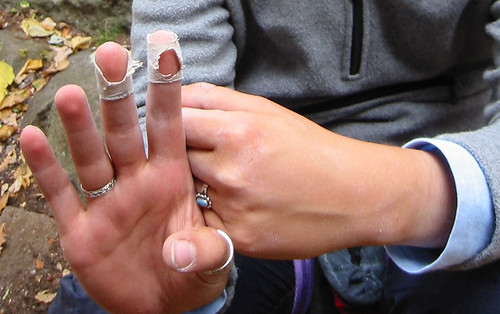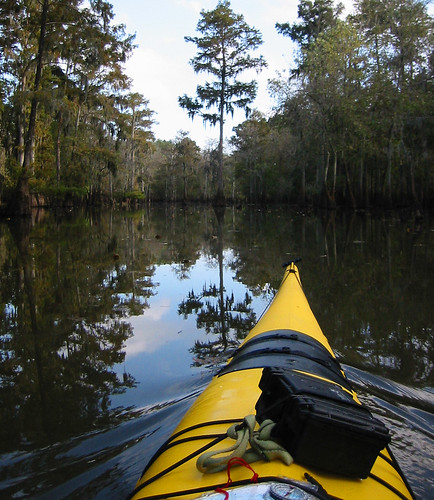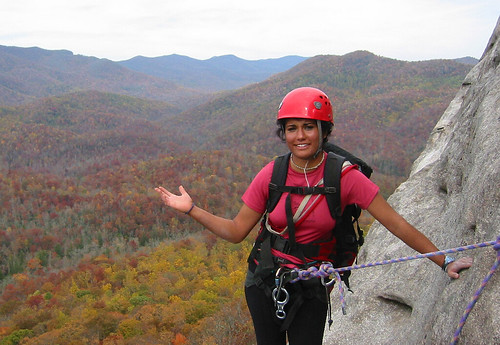Castle Rock Institute Blog
Tuesday, June 28, 2005
Tallie's Take
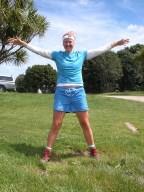
Tallie Jamison, another former CRI student, has updated her website to include an essay she wrote in applying for a Nature Conservancy Internship in Idaho. She writes of her time at CRI:
"I had just read Thoreau's Walden and David Abram's The Spell of the Sensuous during my study abroad semester in New Zealand when I had an experience that transformed the way I think/care/sense/feel about nature. With those thinkers indelible words freshly imprinted in my mind, my classmates and I backpacked along the Heaphy Track (a place that makes Eden look like Beirut). For the first time, I wanted to join Thoreau in his invitation for us to 'settle ourselves, and work, and wedge our feet downward through the mud and slush of opinion, and prejudice, and tradition, and delusion, and appearance, [...] through church and state, through poetry and philosophy and religion, till we come to a hard bottom and rocks in place, which we can call reality, and say, This is, and no mistake.' That afternoon on the trail, I unearthed that which Thoreau hoped would provoke us all to affirm an authenticity of experience and knowledge that moves us to embrace it. I said to myself, in stride, 'The earth is, and no mistake.'"
Read more of the essay (and see lots of her fantastic photos --highly recommended--) here. Oh, and by the way, she was awarded the internship and is in Idaho right now.
Congratulations Tallie!
Sunday, June 26, 2005
Thursday, June 23, 2005
What we learned
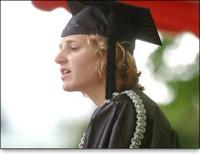
"During our four years here I think most of us can say we've experienced both good and bad times, survived challenging courses and rough weeks of finals. We've developed lasting relationships and found our place on different sports teams, and in clubs and organizations. We've discovered our strengths and weaknesses. In sum, we now have a better idea of who we are and what we believe in.
"We have also, perhaps most importantly, developed the ability to critically think about and analyze the world we live in. While most of us may not be prepared for specific jobs or have definitive career paths, we have something more important. We own the ability to see and interpret situations clearly and effectively, to unmask illusions and witness reality, however dark or unpleasant it may be."
Excerpted from the graduation commencement speech at Denison University, May 15, 2005, written and delivered by Gretchen Roeck, a CRI alumna. Here's a link to the entire speech.
Congratulations Gretchen!
Monday, June 20, 2005
Wednesday, June 15, 2005
Reflexivity: In this, All of us
"The world is inseparable from the subject, but from a subject which is nothing but a project of the world, and the subject is inseparable from the world, but from a world which the subject itself projects." (Merleau-Ponty in The Phenomenology of Perception)
Tuesday, June 14, 2005
The "Environment"
In a controversial report entitled "The Death of Environmentalism," Michael Shellenberger and Ted Nordhaus remind us how important definitions of the term "environment" are for understanding and ultimately addressing "environmental problems." They write:
"If one understands the environment to include humans, then the way the environmental community designates certain problems as 'environmental' and others not is completely arbitrary. Why, for instance, is a human-made phenomenon like global warming-- which may kill hundreds of millions of human beings over the next century-- considered environmental? If it is, then why are poverty and war not also considered environmental problems?
The point here is whether or not to include human beings in our understanding of what constitutes the environment. Understanding ourselves as separate from the environment-- it being just "out there" --too easily allows us to remove human beings from the environmental problems we face when in fact we are, our society is, intrinsically tied to the natural phenomena, physical processes and events we see as problematic. Put differently, we should remember that environmental problems are essentially human problems.
No matter what one's position may be regarding a particular environmental issue, this is all more support for bringing the Humanities into play when studying "the environment." Working only within the sciences and focusing only on the natural world beyond the human world is ultimately too narrow an approach for effectively addressing the complexities of environmental problems. Here at Castle Rock, we strive to implement this insight, and offer it as an important corrective to more science-oriented environmental studies programs.
Monday, June 13, 2005
Thursday, June 09, 2005
Emerson on Life
Here's one that caught my eye.
"Do not be too timid and squeamish about your actions. All life is an experiment. The more experiments you make the better. What if they all are a little coarse, and you may get your coat soiled and torn? What if you do fail, and get fairly rolled in the dirt once or twice? Up again, you shall never be so afraid of a tumble." —Ralph Waldo Emerson
Reading this made me wonder what prevents us from approaching life with this spirit of experimentation. What prevents us from exploring, from venturing beyond the comfort of what we already know and believe to be true?
Wednesday, June 08, 2005
Thursday, June 02, 2005
Meaning-(in-the-)Making
Over four years now since my time at Castle Rock, I still must marvel at the impact that the program and people there made on me and continue to make on me in many ways. Although far from the forests and waterfalls of western North Carolina these days, I can't help but recall how much my current values and ways of thinking reflect the experiences from that 'semester in the woods.'
During those months in the mountains, I came to cultivate a kind of contemplative and centered lifestyle unlike anytime anywhere else either before or even since. Nearly every morning, I could wake up and walk immediately outside into the wilderness where I would often scramble to a nearby waterfall and then just sit quietly to savor the raw beauty of dawn. Let not the effusive nostalgia deceive, however. My memories of Castle Rock were not all quiet and calm. In fact, if I had to characterize the experience more succinctly, I'd say it was invigorating, intense, and intimate.
Invigorating because here was a way of life and learning that I'd desperately been seeking and needing for too, too long. Finally, for the first time, I had the chance to dive into an environment in which I could contribute in a very real, felt way because of the communal orientation of the program and the ability to engage almost continuously with professors--who really in effect soon became mentors. Plus, and very dear to my heart, I could spend as much time outdoors as I desired--reading, writing, romping, resting, and coolest of all, having class discussions outside, often literally a mountaintop experience!
Intense because here was a program with professors who could always work with me, whether on the mountain-biking trail or over the dinner table. Thus, they could all the better gauge my capabilities, captivate my curiosity, and personally challenge me in ways virtually impossible in a conventional college setting. Moreover, since the academic approach was uniquely interdisciplinary, every course and every discussion were intended to interrelate and encourage one to more thoroughly engage the layered complexity/connectivity of the topics and readings. As cerebral as that might sound, it made so much more sense to harness the 'cross-pollinating potential,' if you will, of different subjects rather than keep pretending they were all fundamentally distinct or irrelevant to the others.
And intimate. Of course, I had all sorts of opportunities for solitude, studying, and such, but ultimately I came to learn that the most meaningful moments spent at Castle Rock were the goofin' off and heart-to-hearts with my newfound friends (including professors, of course!). In many ways, the hallmark of Castle Rock isn't so much the outdoor appeal or the interdisciplinary approach as it is the close-knit community formed from living and exploring together in the wild. Above all, I learned that the meaningfulness is what is made of it, collectively, cooperatively, and creatively.
I didn't leave Castle Rock with some romantic, rueful reminiscing of an experience unlike any other (though it was). Rather, I look back on the program as a pivotal opportunity to re-collect what's meaningful to oneself and playfully re-create more meaningful moments through the precious bonds with others.
Responsible Choice — What we learn
One of my professors at the University of Chicago, Jonathan Z. Smith, defines "liberal learning" as something that both requires and prepares us for "making choices and accepting responsibility." It "entails an ethos of enlarging one's range of possibilities [e.g., by becoming more aware of complexities], while accepting an ethic of care." This sort of learning, I'm sure J.Z. would agree, is intrinsically valuable by virtue of its parallels to what it means to live humanely, that is as a more fully human being.
Without going into it too deeply, we might think of our lives as a product of the choices we make each day and the response we have to the consequences of the choices. Every action we take, after all, involves not only choosing whether or not to act, but more importantly, choosing the nature of the action, its temporal and spatial conditions, how its done, with whom, in combination with which other smaller actions, with a particular attitude, and so on. As we go about our daily lives, interacting with others and the world around us, we are constantly making choices even if only habitually (what to have for lunch, what people to greet, what route to take home, for example). It's unavoidable. If we are alive, we are choosing.
If so, wouldn't it be a good idea to improve our choice making skills? How can we learn to make better choices, and hence end up with better consequences? Learning, the sort of liberal learning described above seems like the obvious answer. It makes a great deal of sense then to encourage liberal learning, to employ various cultural and historical facts that strengthen our ability to make more informed choices, to be more critical of assumptions, to evaluate habits, to find unexamined connections and relationships between things, people, ideas, etc. J.Z. Smith emphasizes the notion of "argument" as a way to teach these sorts of skills at the core of being educated. Being able to make and defend an argument does, certainly, involve choosing with good reason between alternative points of view.
I bring all this up simply because it is yet another principle guiding the educational mission of Castle Rock. We strive on a regular basis to reflect upon the nature of the choices we face in different contexts, in personal/community interactions, in our outdoor adventures, in our course readings and discussions, and in how we understand the broader world. This added attention and consciousness, we think is the basis for a great education, as well as a primary force for living a meaningful life. Castle Rock is a place for everyone involved to practice.


